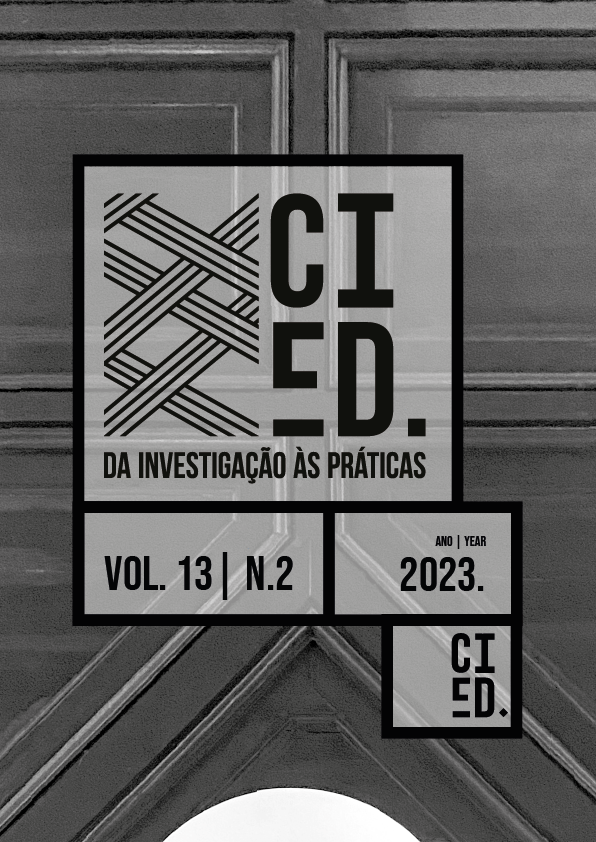Exploration of the professional identities of three Mathematics teacher educators through narratives
DOI:
https://doi.org/10.25757/invep.v13i2.362Keywords:
Professional identity, Math teacher trainers, NarrativesAbstract
A study of the identities, understood as collections of stories, of three trainers who acted in 2021 as teachers of teaching practice of mathematics teachers studying a postgraduate program is presented. A theoretical perspective is adopted that understands identity as a discursive activity, that is, collections of a particular type of stories, which are reifying, endorsable and significant. Teachers wrote stories about the trainers they did their teaching practice with as part of a course in the postgraduate program. These stories were presented to three of the trainers who indicated which one they most identified with. Then, stories told by them by email and interview were collected. The analysis of the trainers' responses made it possible to detect aspects of their real and designated identities. In particular, some episodes of stories written about them with whom they did not identify catalyzed, in turn, their own narratives that makeup part of their designated identity. It was also shown that professional identities are linked to the subject taught. Additionally, it was observed that the stories used constitute an appropriate methodological tool to study the identity of the trainer and to promote reflective processes on professional practice. Specifically, it was evidenced that stories in the third person can account for the identity of the subjects, as well as stories in the first person.
Downloads
References
Bjuland, R., Cestari, M. L. y Borgersen, H. E. (2012). Professional mathematics teacher identity: Analysis of reflective narratives from discourses and activities. Journal of Mathematics Teacher Education, 15(5), 405–424. https://doi.org/10.1007/s10857-012-9216-1
Bruner, J. (2013). La fábrica de historias. Derecho, literatura, vida. Buenos Aires: Fondo de Cultura Económica.
Cyrino, M. (2018). Prospective mathematics teachers’ professional identity. En M. Strutchens, R. Huang, D. Potari y L. Losano (Eds.), Educating prospective secondary mathematics teachers: Knowledge, identity, and pedagogical practices (pp. 269–285). Switzerland: Springer.
Da Ponte, J. P. (2011). Teachers’ knowledge, practice, and identity: essential aspects of teachers’ learning. Journal of Mathematics Teacher Education, 14, 413–417. https://doi.org/10.1007/s10857-011-9195-7
Darragh, L. (2016). Identity research in mathematics education. Educational Studies in Mathematics, 93, 19–33. https://doi.org/10.1007/s10649-016-9696-5
Gee, J. (2001). Identity as an Analytic Lens for Research in Education. Review of Research in Education, 25, 99–125. https://doi.org/10.3102/0091732X025001099
Grootenboer, P. (2006). Mathematics educators: Identity, beliefs, roles and ethical dilemmas. En P. Grootenboer, R. Zevenbergen y M. Chinnappan (Eds.), Identities, Cultures and Learning Spaces (pp. 270–277). Merga.
Lutovac, S. y Kaasila, R. (2017). Future directions in research on mathematics-related teacher Identity. International Journal of Science and Mathematics Education,16(4), 759–776. https://doi.org/10.1007/s10763-017-9796-4
Marshman, M. (2021). Learning to teach mathematics: How secondary prospective teachers describe the different beliefs and practices of their mathematics teacher educators. En M. Goos y K. Beswick (Eds.), The learning and development of mathematics teacher educators (pp. 123–144). Cham, Suiza: Springer. https://doi.org/10.1007/978-3-030-62408-8_7
Molfino, V. y Ochoviet, C. (2015). Un estudio discursivo de la identidad de profesores de matemática en formación de posgrado. Perspectiva Educacional, 54(2), 74–91. https://doi.org/10.4151/07189729-Vol.54-Iss.2-Art.365
Molfino, V. y Ochoviet, C. (2019). A mathematics teacher’s identity study through their teaching practices in a postgraduate training course. The Mathematics Enthusiast, 16(1), 389–407. https://doi.org/10.54870/1551-3440.1465
Rojas, F., Montenegro, H., Goizueta, M. y Martínez, S. (2021) Researching modelling by mathematics teacher educators: Shifting the focus onto teaching practices. En M. Goos y K. Beswick (Eds.), The learning and development of mathematics teacher educators (pp. 367–382). Cham, Suiza: Springer. https://doiorg.proxy.timbo.org.uy/10.1007/978-3-030-62408-8_19
Sanhueza, S., Penalva, M., y Friz, M. (2013). Identidades y competencias profesionales de estudiantes para maestro de educación infantil relativas a la enseñanza de la geometría. Relime, 16(1), 99–122.
Sfard, A. y Prusak, A. (2005). Telling Identities: In Search of an Analytic Tool for Investigating Learning as a Culturally Shaped Activity. Educational Researcher, 34(4), 14–22. https://doi.org/10.3102/0013189X034004014
Downloads
Published
How to Cite
Issue
Section
License
Copyright (c) 2023 Verónica Molfino Vigo, Cristina Ochoviet Filgueiras, Daniela Pagés Rostán

This work is licensed under a Creative Commons Attribution 4.0 International License.
Articles published or submitted to Da Investigação às Práticas are licensed according to Creative Commons Attribution License (CC BY 4.0). Authors agree that:
Copyrights of all articles published are retained by authors with first publication copyright granted to the journal.
All articles are under the Creative Commons Attribution License recognizing the authorship of the publication and identifying that first publication took place in this journal.
Authors have the right to free distribute or make available in private or institutional pages the version published by Da Investigação às Práticas: Estudos de Natureza Educacional provided the original proper citation.
The journal only accepts articles not published previously (except in the form of an abstract or as part of academic thesis), that it is not under consideration for publication elsewhere. After published, the article cannot be published again partial or totally without the editorial board consent.





 e-ISSN: 2182-1372
e-ISSN: 2182-1372